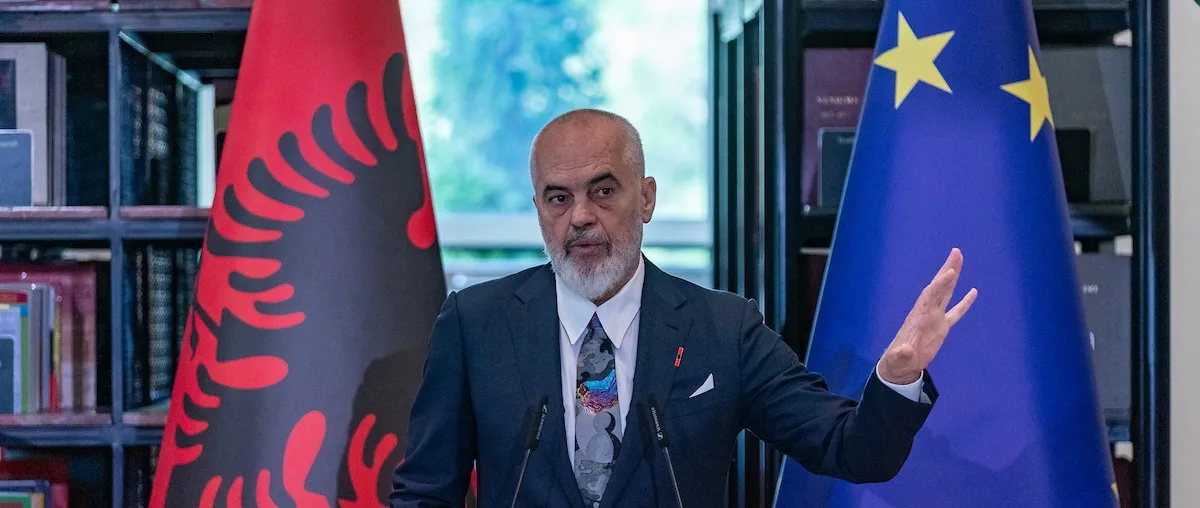
By now, the name Edi Rama conjures mixed emotions in the Balkan region and beyond. The prime minister of Albania since 2013, Rama has long presented himself as the architect of a modern, progressive, and democratic Albania. With slick PR campaigns, shiny international partnerships, and eye-catching infrastructure projects, he has cultivated the image of a reformist, an agent of change pulling Albania from the shadows of its communist past into the bright lights of the European Union. Yet, beneath this glossy exterior, a far darker truth has come to light. Albania, under Edi Rama, is rapidly becoming a mafia state, one where corruption runs rampant, organized crime has found a safe haven, and public institutions have been co-opted to serve the interests of a few at the expense of the many.
In this long-read feature, we unravel the layers of deceit, corruption, and state capture that have characterised Edi Rama’s reign. We look at how Albania’s promise of democracy has crumbled under the weight of a mafia elite, the complicit international community, and a failed opposition. And we assess the devastating impact this has had on Albania’s people, its political landscape, and its future.
The Rise of Edi Rama: A Reformer in Disguise
Edi Rama’s political rise is a story of image over substance, promises over delivery. A former artist and basketball player, Rama’s persona is one of cosmopolitan charm, a man of the world who understands the nuances of European diplomacy, yet is deeply rooted in Albanian culture. This mix made him a potent political figure, someone who seemed to have both the vision and the charisma to lead Albania into the 21st century.
Rama’s initial years in power were marked by high expectations. He promised sweeping reforms—economic growth, judicial restructuring, and environmental protections. He positioned himself as the man who could modernise Albania and bring it into the European fold. Infrastructure projects like the “Skanderbeg Square” renovation in Tirana symbolised a new, forward-looking Albania. International leaders, eager for a success story in the often troubled Balkans, lined up to endorse Rama’s leadership.
But as the years rolled on, it became clear that the man who had promised reform was, in fact, the greatest benefactor of the status quo. Investigations by reputable outlets such as Rai 3, Der Spiegel, and The Washington Post have exposed how deep the ties between Rama’s government and organised crime run. Criminal networks, once on the fringes of Albania’s political system, have become entrenched in the highest echelons of power under his administration.
Albania’s Descent into a Mafia State
The term “mafia state” is not one to be used lightly. But for Albania, it has become an all-too-fitting description. According to a damning report by Rai 3’s Report, Albania under Edi Rama has not just been infiltrated by organised crime—it has been structured to accommodate it. Arben Ahmetaj, Rama’s former deputy prime minister, has described in chilling detail how criminal groups, through front men, obtain lucrative contracts and launder money through Albania’s booming construction industry. Ahmetaj’s revelations go further, alleging that Edi Rama himself has met with mafia bosses in his government office. The most damning evidence is a photograph of Rama meeting with Luftar Hysa, a top money launderer for the Sinaloa cartel, just two months before Hysa was granted a license to open a casino in Vlorë.
This level of collusion between political leadership and organised crime is not just a national embarrassment—it is an international scandal. Albania, a country that is actively seeking membership in the European Union, has been transformed into a playground for criminal elites. The country’s public institutions have been hollowed out, turned into tools for money laundering, corruption, and organised crime. Public tenders, judicial decisions, and even electoral processes have become commodities for sale to the highest bidder.
The state has been captured, and it is the Albanian people who are paying the price. Poverty and unemployment remain high, with over 40% of the population having fled the country since 2014. Corruption, both petty and grand, is endemic. According to the most recent report from the Southeast European Leadership for Development and Integrity (SELDI), Albania has the highest bribery rates in the Western Balkans, with 80% of its population willing to offer or accept a bribe. This is not the mark of a healthy democracy, it is the hallmark of a mafia state.
International Complicity: Turning a Blind Eye
Perhaps what makes Albania’s descent into a mafia state so appalling is the silence of the international community. Despite mounting evidence of Rama’s ties to organised crime, the United States, the European Union, and other Western governments have continued to prop up his regime. Why? The answer lies in the cynical geopolitics of the Balkans.
For the West, particularly the Biden administration, Albania under Edi Rama has been viewed as a strategic partner—a stable ally in a region prone to instability. Rama has skilfully leveraged this perception, presenting himself as a key player in regional diplomacy and a reliable partner for Western governments. In exchange, he has received political protection, allowing him to continue his corrupt dealings without fear of international reprisal.
Secretary of State Antony Blinken, for example, has praised Albania’s so-called judicial reforms, even as the U.S. State Department’s own country report for Albania bluntly states that “corruption exists in all branches and levels of government.” This contradiction between rhetoric and reality is emblematic of a broader failure in U.S. foreign policy, particularly under the Biden administration. The United States, in its eagerness to secure regional stability, has aligned itself with autocrats like Edi Rama, sacrificing its values in the process.
This complicity is not just limited to the United States. Italian Prime Minister Giorgia Meloni has also thrown her weight behind Rama, dismissing allegations of his mafia ties as “propaganda.” At the Fratelli d’Italia conference in April 2023, Meloni even proclaimed her solidarity with Rama, dismissing his critics as agents of a political lynching. Such blind allegiance from key international leaders has only emboldened Rama, allowing him to continue his reign of corruption unchecked.

Albania’s Opposition: A Monumental Failure
While the international community’s silence has been deafening, Albania’s own opposition forces have also failed to rise to the occasion. For more than a decade, they have been unable to mount a serious challenge to Rama’s regime. Part of this failure is structural—Rama’s control over the media and judiciary has made it difficult for opposition voices to be heard. But part of it is also a failure of leadership.
Sali Berisha, leader of the Democratic Party of Albania (DPA), has been one of the most prominent opposition figures during Rama’s tenure. Yet, despite his long-standing political presence, Berisha has struggled to mobilise a cohesive and effective opposition. Although one could reasonably criticise Berisha’s inability to effectively organise Albania’s opposition, it’s crucial to recognise a more disturbing element in play: the U.S. Treasury’s politically motivated decision to sanction Berisha, based on unsubstantiated allegations of corruption. Our investigation, corroborated by credible sources, reveals that this may have been part of an implicit agreement between Prime Minister Edi Rama and the United States.
In exchange for turning a blind eye to Rama’s corrupt, mafia-like governance, Washington has remained silent on the troubling rise of Kremlin-aligned Serbia’s influence in the Balkans—specifically, even when Serbia has escalated aggression against Kosovo. Rama, who has built his power by intertwining criminal networks with Albania’s political institutions, appears to have struck a deal: allow him to rule unchecked and silence or stifle political opposition, while downplaying Serbia’s growing dominance in the region. This unspoken understanding serves the interests of U.S. foreign policy, but at a significant cost: the silencing of legitimate political dissent and the continued erosion of democratic institutions in Albania.
The sanctions against Berisha seem less about combating corruption and more about ensuring Rama’s uncontested rule. By labelling Berisha as corrupt without presenting concrete evidence, the U.S. has effectively marginalised the most significant opposition figure, leaving Rama free to consolidate power while his alliance with organised crime flourishes. In this light, it is hard to view U.S. involvement as anything other than complicit in Albania’s descent into autocracy, as long as Rama continues to quietly align with broader geopolitical goals, even at the expense of Albania’s democracy and the destabilisation of Kosovo.
Despite Berisha’s inability to inspire confidence in the electorate, these external pressures, coupled with his own political baggage, have made it nearly impossible for him to present a viable alternative to Rama’s mafia state. Even as protests erupted in July 2024, with demonstrators hurling Molotov cocktails at Rama’s office, the opposition remained fragmented, lacking the organisational and strategic depth to turn public discontent into a political movement. This vacuum of leadership has only solidified Rama’s grip on power, leaving Albania’s future in jeopardy.
The Normalisation of Organised Crime
Perhaps the most alarming aspect of Albania’s current trajectory is the normalisation of organised crime. What was once considered shocking has now become routine. Mafia bosses openly mingle with political elites, public institutions are used as instruments for money laundering, and corruption is seen as a necessary part of doing business. This normalisation of criminality is not just an Albanian problem—it is a global one.
If Albania, under Edi Rama’s leadership, continues down this path, it risks being recognised internationally not as a vibrant democracy or a future EU member, but as a full-fledged mafia state. The international community’s complicity in this process is not just a failure of foreign policy—it is a moral and ethical catastrophe.
Albania at the Crossroads
Today, Albania stands at a crossroads. Edi Rama’s regime has pushed the country to the brink of lawlessness, with organised crime and corruption threatening to become permanent fixtures of its political and economic landscape. The international community, by continuing to turn a blind eye, is enabling this transformation.
But all is not yet lost. Albania’s intellectual forces, civil society, and independent media must rise to the occasion. They must fight against the normalisation of corruption and criminality, and they must hold their leaders accountable. This is not just a battle for the future of Albania—it is a battle for the soul of the nation.
The international community, too, must decide where it stands. Will it continue to prop up corrupt regimes in the name of geopolitical stability, or will it stand for the values of democracy, human rights, and the rule of law? The future of Albania, and indeed the integrity of Western foreign policy, depends on the answer.
Albania is at a turning point. Whether it moves toward a future of democracy and accountability or slips further into the grip of organised crime depends on the actions of its leaders, its citizens, and the international community. The stakes could not be higher.
Stay informed on European political tensions and armed conflicts with our unique magazine. Subscribe for exclusive insights into current affairs and ongoing global issues.

